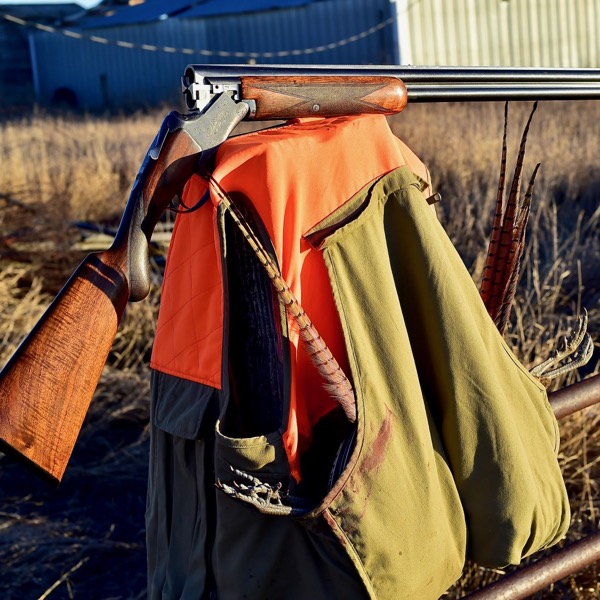My dad grew up in the outdoors with a strong adult influence from his Uncle Mel. And he made sure that he shared what he’d learned to love and appreciate with me and my brother. What he gave us still directs our steps.
By Casey Cappell for Press Pros
(Ed. Note: Casey Cappell is the son of former Press Pros outdoors contributor, Tom Cappell, who passed away in two years ago. Tom, who wrote for various outdoors publications under various names, lives on through the lessons and experiences he shared, in print, and in the field with his two sons. We share this short story as a tribute to his contribution to the outdoors and to Press Pros readers.)
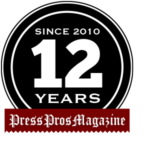 On one of his better days before he passed, Dad talked at length to my brother Carey and me about life, and living.
On one of his better days before he passed, Dad talked at length to my brother Carey and me about life, and living.
He said, “Tthis is part of it…what I’m going through now. But it’s worth it for what I enjoyed on the trip all those years to get here. If you remember anything about our years together, make sure you enjoy your own trip.”
He was an outdoorsman all of his life, from the time he was a young boy tagging around after his uncle, Melvin Davidson, whom he wrote about often in his stories. Readers knew him as Uncle Mel. Later in life, after getting through college and while raising a young family, he turned to writing while working days as an electrical engineer for a local company in our hometown of Columbia, Missouri. When my twin brother and I were born, we were similarly fortunate to have many of the same outdoors experiences he’d known with Uncle Mel, whom we barely knew. We were just four years old when he passed away in 1983.
We hunted and fished a lot, and never without the background stories of his first rabbit, squirrel, pheasant, and channel catfish out of the creek on Uncle Mel’s 220 acre farm. And at least once a year, during rabbit and pheasant season in Missouri, Dad would bring along Uncle Mel’s shotgun, a Winchester Model 12 that was given to him before Uncle Mel died.
It was his pride and joy, and a gun for which Uncle Mel had scrimped and saved for years before he bought it in the fall of 1960. Dad, of course, took loving care of that gun, rarely fired it, and made sure that it ended up in family hands, even before he passed.
The fall hunting season the year of Dad’s passing wasn’t much fun. Just months after he died, I went out a couple of times with friends. Another issue with hunting was the fact of there not being anyplace to hunt! Land in the areas where Dad hunted back in the day has long since been bought, and sold, and bought again. and are without question off limits – posted. Only a select few people that I know have privileges to hunt on private land in Missouri now.
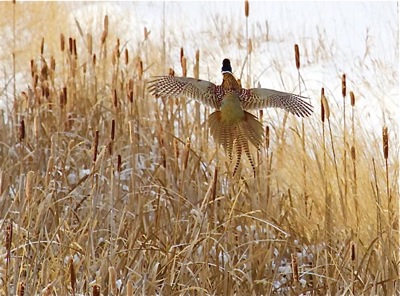 But a friend in Kansas called me this past November and said, “Why don’t you come down here for a weekend and we’ll find some birds.” David Schiff lives outside of Concordia, where his family still farms, and he promised plenty of action. Packing for the trip, I thought of Dad, and the last thing I poked in the back of my Jeep was Uncle Mel’s Model 12.
But a friend in Kansas called me this past November and said, “Why don’t you come down here for a weekend and we’ll find some birds.” David Schiff lives outside of Concordia, where his family still farms, and he promised plenty of action. Packing for the trip, I thought of Dad, and the last thing I poked in the back of my Jeep was Uncle Mel’s Model 12.
I’m not a writer like he was, but I know that Dad would have spent at least half of that first morning last November just taking notes. On a perfect day, with bright sun and cool temperatures, David, his friend Lee, and I took Lee’s two Shorthair pointers and headed out through a picked cornfield that Dad would have described this way: “Poorly tilled, as evidenced by the abundant foxtail cover between the rows…and with plentiful crop remnants.”
There was pheasant sign among those remnants, visible in what was left of a light snow that had fallen just two days before I arrived. Mostly thawed, it made for sticky walking.
While the sign was there, the birds weren’t. We walked the entire morning and scared up one hen.
“We’re going to get down out of this wind…down along the creek,” said David, pointing to an adjacent section of picked summer wheat and a weedy creek bottom. “If there’s a bird anywhere we’ll find some there.”
Returning to the truck for sandwiches and coffee, I slipped the Model 12 out of its case and shoved some Remington shells in it as we stepped across a ditch and into different habitat. The brushy creek turned out just as David had predicted. First, we bumped a covey of quail, which startled us to the point of not even raising a gun. Then, one of the shorthairs went on point. Lee kick through the point and a hen pheasant launched…then another, and another. We all expected another bird, and hopefully a rooster, but it never came.
Farther on up the creek we found two more hens, and a couple of singles out of the quail we had bumped. Lee shot one of those ahead of a nice point. But no roosters.
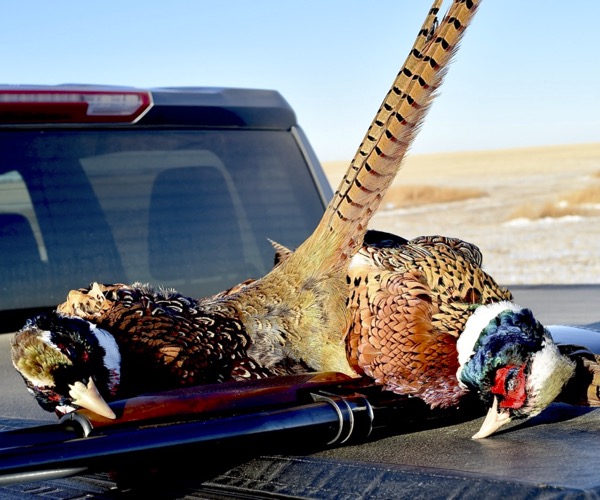 That is, not until we’d worked our way almost a mile, and out of sight of our truck parked back on the ridge. Suddenly, Lee’s male Shorthair, Boomer, slammed on point. First a hen, then another…and just as we relaxed from expectation, one, and then other rooster came roaring out ahead of the dogs. At their flush, more hens rose as I raised the gun and tried to focus on one of the original roosters, aware that more birds of brighter color were now in the air and making a lot of commotion in their effort to get away.
That is, not until we’d worked our way almost a mile, and out of sight of our truck parked back on the ridge. Suddenly, Lee’s male Shorthair, Boomer, slammed on point. First a hen, then another…and just as we relaxed from expectation, one, and then other rooster came roaring out ahead of the dogs. At their flush, more hens rose as I raised the gun and tried to focus on one of the original roosters, aware that more birds of brighter color were now in the air and making a lot of commotion in their effort to get away.
There were too many birds to account for as still more hens were flushing and in the way of a clean shot on at least one of the roosters that had gotten up in the second wave. I heard shooting to my left, and just as I dropped the Model 12 to better scan, another rooster – the last – blew out less than ten yards away, crossing back to my right. Unobstructed now, I leveled the Winchester and swung just past its outstretched head. At my shot the bird folded and somersaulted into a plum bush.
“That was fun,” David shouted, holding up a bird of his own. In fact, each of us had knocked one down out of the flurry.
On many of my days with Dad in the field, we came home with less than a limit because he would take as much time to make notes about things as he did to hunt. I made some notes of my own, dictating into my smart phone. Then we made a wide circle on the way back to the truck and Lee picked up what surely was one of the roosters we had flushed previously, and we called it a day – a successful one at that.
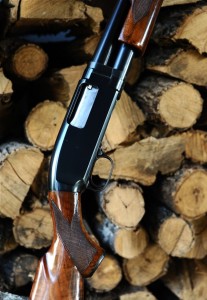 We took some pictures and reconstructed the walk, the flushes, and the shooting. And the thought came to my mind that Dad would have been proud: proud to take less than you might have, allowing that no one really needs to shoot a limit if the experience is otherwise fulfilling.
We took some pictures and reconstructed the walk, the flushes, and the shooting. And the thought came to my mind that Dad would have been proud: proud to take less than you might have, allowing that no one really needs to shoot a limit if the experience is otherwise fulfilling.
He would have been proud that we were there in the first place, enjoying what he patiently shared with me for all those years we spent together on days just like this one.
And, he would have been pleased at that old Model 12, still as dependable as the life lessons handed down from Uncle Mel, to Tom Cappell – to Casey Cappell.
“Less is so often more,” he used to say.
He was so right!
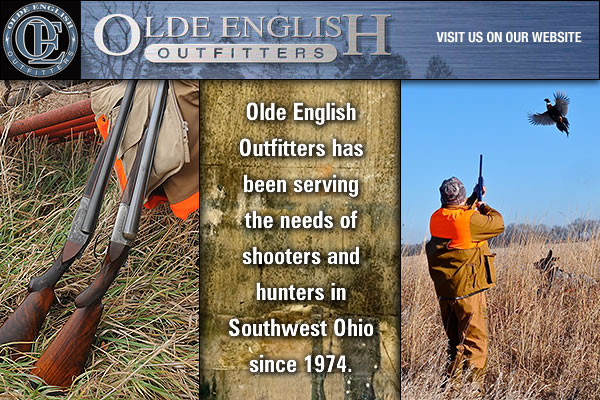
Olde English Outfitters, in Tipp City, Ohio, proudly sponsors tales of the outdoors on Press Pros Magazine.com.
